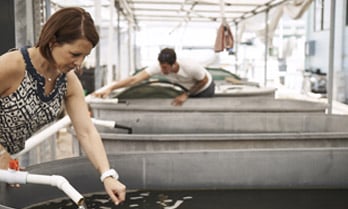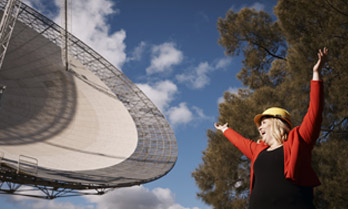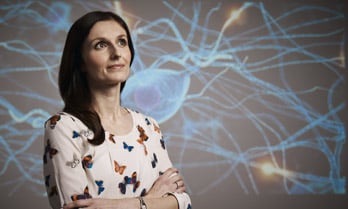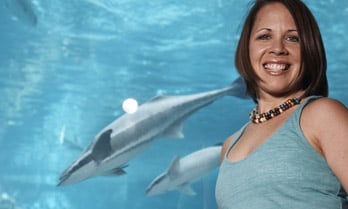Dr Cara Doherty, materials scientist, CSIRO, Melbourne
01 September 2014
Clean water with crystals
Cara Doherty is developing new technologies that could transform water filters, batteries and medical sensors, and clean up carbon emissions. And it all comes down to holes and surface area.
She has a vision for a new manufacturing industry for Australia. She works with crystals that are packed with… nothing. They’re highly porous sponges—down to a molecular level—and can be customised to absorb almost any molecule.
These crystals are metal–organic frameworks (MOFs). They can be challenging to make. And it’s also difficult to determine which crystal will be good for which job. But it’s even harder to deploy the crystals—to put them in the right place to do useful work.
Cara uses antimatter (positrons) and synchrotron light (X-rays) to measure the crystals and their properties. Then she uses her patented technique to imprint useful shapes for devices.
With the help of her L’Oréal For Women in Science Fellowship she investigated how to take the next step: to develop the 3D structures that would be needed for a smart water filter.
Qualifications
| 2009 | PhD (physical chemistry), The University of Melbourne/CSIRO Molecular and Health Technologies, Melbourne |
| 2002 | Honours (physics), Curtin University of Technology, Perth |
| 1999 | Bachelor of Multidisciplinary Science (physics), Curtin University of Technology, Perth |
Career highlights, awards, fellowships, grants
| 2014–2016 | ARC Discovery Early Career Researcher Award (DECRA) Fellow, 3D hierarchically porous structures from metal–organic frameworks (MOFs) for investigation of their structural, spatial and chemical performance as biomolecular scaffolds for use in next generation sensing devices and biomedical implants, CSIRO Manufacturing Flagship, Melbourne |
| 2014 | Contributing Investigator, Magnetic framework composites as chemical and biological contaminant scavengers for the treatment of surface, sea and groundwater, Intelligent Processing Transformational Capability Platform for an IASTE student |
| 2013–2014 | Principal Investigator, Converting metals into intelligent ultra-porous metal–organic frameworks-based filters, Intelligent Processing Transformational Capability Platform for a Proof of Concept study |
| 2013 | Victorian Young Tall Poppy Science Award, Australian Institute of Policy and Science |
| 2012–2014 | Contributing Investigator, Monitoring and prediction of catastrophic multi-sloped screen failures, The Australian Coal |
| 2012–2013 | Contributing Investigator, CSIRO Office of the Chief Executive Postdoctoral Fellowship, Patterning biological activity in porous materials |
| 2012 | The Theo Murphy High Flyers Think Tank 2012 Award, Australia’s Population: Shaping a Vision for our Future, Adelaide |
| 2012 | Invited presentation, Nanostructured mesoporous materials for bio-encapsulation and device fabrication, International Conference on BioNano Innovation, Brisbane |
| 2012 | Invited presentation, Combining metal–organic frameworks with functional micro- and nano- particles, Centre for Imaging Technology Commercialization—4th International Conference Smart Materials, Structures and Systems, Montecatini, Italy |
| 2011 | Australian Academy of Science Australia–Korea Early Career S&T Researchers Program Award to travel to South Korean Laboratories |
| 2010–2011 | Contributing Investigator, Office of the Chief Executive Postdoctoral fellowship CSIRO, Thermally rearranged polymer membranes: tailoring porosity for separation |
| 2009–2014 | CSIRO Science Leader Postdoctoral Fellow, Advanced functional porous materials for energy, water and the environment, CSIRO Materials Science and Engineering |
| 2007 | Postgraduate Overseas Research Experience Scholarship, 3 months in Max Plank Institute, Department of Colloids and Interfaces, Golm, Germany. From The University of Melbourne |
Top five publications
Doherty CM, Grenci G, Riccò R, Mardel JI, Reboul J, Furukawa S, Kitagawa S, Hill AJ and Falcaro P (2013) Combining UV Lithography and an Imprinting Technique for Patterning Metal–Organic Frameworks,Advanced Materials 25: 4701–4705. (Impact factor 15.409, 5 citations)
Doherty CM, Buso D, Hill AJ, Furukawa S, Kitagawa S and Falcaro P (2014) Using Functional Nano- and Microparticles for the Preparation of Metal–Organic Framework Composites with Novel Properties, Accounts ofChemical Research 47: 396–405. (Impact factor 24.348, 3 citations)
Falcaro P, Ricco R, Doherty CM, Liang K, Hill AJ and Styles MJ (2014) MOF positioning technology and device fabrication, Chemical Society Reviews DOI: 10.1039/C4CS00089G. (Impact factor 30.425, 0 citations)
Doherty CM, Caruso RA, Smarsly B, Adelhelm P and Drummond CJ (2009) Hierarchically Porous Monolithic LiFePO4/Carbon Composite Electrode Materials for High Power Lithium Ion Batteries, Chemistry of Materials21: 5300–5306. (Impact factor 8.535, 103 citations)
Doherty CM, Caruso RA, Smarsly B and Drummond CJ (2009) Colloidal Crystal Templating to Produce Hierarchically Porous LiFePO4 Electrode Materials for High Power Lithium Ion Batteries, Chemistry of Materials21: 2895–2903. (Impact factor 8.535, 93 citations)




